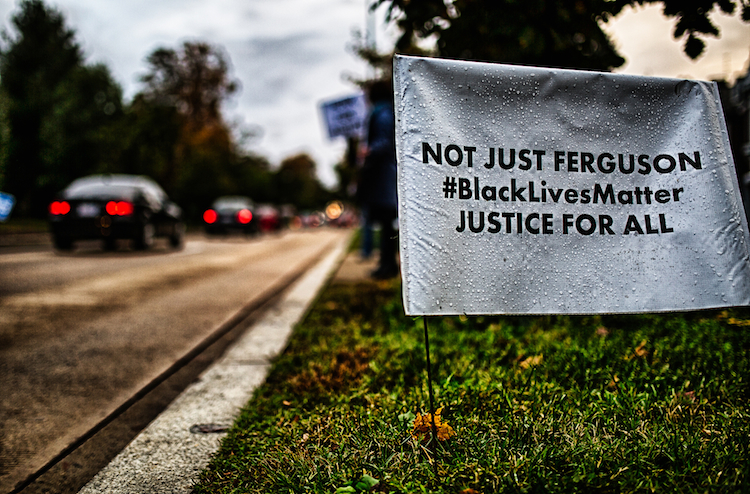Report by Robin L. Flanigan
Race and Privilege at the Gas Pump

A chance interaction last year made me think about my white skin in a way I haven’t in decades—not since an old boyfriend had to skip my college graduation party because my family disapproved of me dating a black man.
I’d stopped for gas at a Kwik Fill station near my home in Rochester, New York. Walking back to my car after paying cash, I overheard a black woman saying goodbye to a group in a car about to leave the pump beside mine.
“Okay, guys, stay safe.” She waved. “Black lives matter.”
I’d been hearing that phrase for four years on television and the radio, since it became a movement following the death of seventeen-year-old Trayvon Martin in Florida. I’d seen it printed on a rainbow-colored banner outside a nearby church and on signs to protest fatal shootings of black men in Louisiana and Minnesota. I’d read about it in the newspaper. But before this moment at the gas station, I’d never thought of those three words as anything more than a slogan. I’d always thought, Of course they do.
I was shocked—well, I’m not sure what I was. But before I could second-guess myself, I was walking past my own car, following the woman to the next pump. I told her I’d overheard her say “Black lives matter.” There was an awkward pause as I processed how I must have sounded to her—as if there had to be a specific reason, some sanctioned event or media interview, for uttering the phrase.
“I just wanted to tell you I’m sorry you have to do that,” I said.
The woman smiled and thanked me as she slid the nozzle into her tank.
“They’re all good people,” she said. “They’re educated, they have good jobs. My friend earned that BMW.”
I nodded. “So that was just a random comment?”
She gestured in the direction her friends had headed. “That’s an expensive car full of black people.”
All of a sudden, I saw the potential for police sirens, for weapons. A potential that wouldn’t vanish by moving to another state, which is what I’d done in 1999, when my husband and I left North Carolina. We'd relocated to upstate New York for several reasons, mostly to be closer to family and to take jobs at other newspapers. But it had been my old job as the education reporter at the Herald-Sun in Durham that made me never regret leaving the South.
I'd covered the school board, which at the time had four white members and three black members and openly discussed matters—and voted—along racial lines. At nearly every meeting, the aggressive, unyielding leader of the Durham Committee on the Affairs of Black People, a local organization that mobilized black voters and had worked with national civil rights groups to end segregation, made sure the spotlight stayed on race. For me, what began as exciting journalism—this sort of talk was taboo farther north, where I’d come from—eventually morphed into a predictable string of stories that, to create context for readers, too often required referencing skin color along with the names and titles of the people I quoted.
We are on the cusp of the twenty-first century! I’d wanted to scream then. Why are you all stuck in the past?
Almost fifteen years later, that moment at the gas pump is why.
“Again,” I said, “I’m so sorry.”
“You just made my day.” The woman leaned against her car and beamed. “Thank you for acknowledging your privilege.”
Is that what I had done? I’d approached her as a woman—not as a white woman, I’d thought—who had witnessed an unsettling exchange. But when she said that, I understood the gritty reality of the moment for her immediately.
I think about the color of my skin when I’m lounging by the pool or choosing foundation, not when I’m driving around town with friends. I grew up with a mom who told me to be safe when I left the house because she didn’t want me causing trouble, not because she had to worry about whether an authority figure would end my life without provocation.
Returning to my car, I thought about how this stranger could have rejected my impulsive attempt to connect. But she’d understood my intention, even as she called me out on the advantages of my skin color, something she had every right to do.
For so long, I had thought race was at the forefront of too many discussions, that we could acknowledge the full impact of racism—and move beyond it—by moving on. I hate to admit it now, but sometimes I still question whether I would have approached the woman at the gas pump if I’d given myself time to think instead of moving toward her from a visceral place. A human place.
Art Information
- "Black Lives Matter" © Johnny Silvercloud; Creative Commons license.
 Robin L. Flanigan worked in newsrooms for eleven years, winning several national awards, and is now a freelance writer and essayist. Her essays have appeared in the Sun, Talking Writing, Motherwell, and other literary magazines as well as two anthologies. Robin’s book M is for Mindful: A Child’s Guide to Peaceful Living is forthcoming in 2018, and she loves to write in her head when she’s not writing by hand.
Robin L. Flanigan worked in newsrooms for eleven years, winning several national awards, and is now a freelance writer and essayist. Her essays have appeared in the Sun, Talking Writing, Motherwell, and other literary magazines as well as two anthologies. Robin’s book M is for Mindful: A Child’s Guide to Peaceful Living is forthcoming in 2018, and she loves to write in her head when she’s not writing by hand.
Connect with her on Robin L. Flanigan’s website or on Twitter @thekineticpen.
